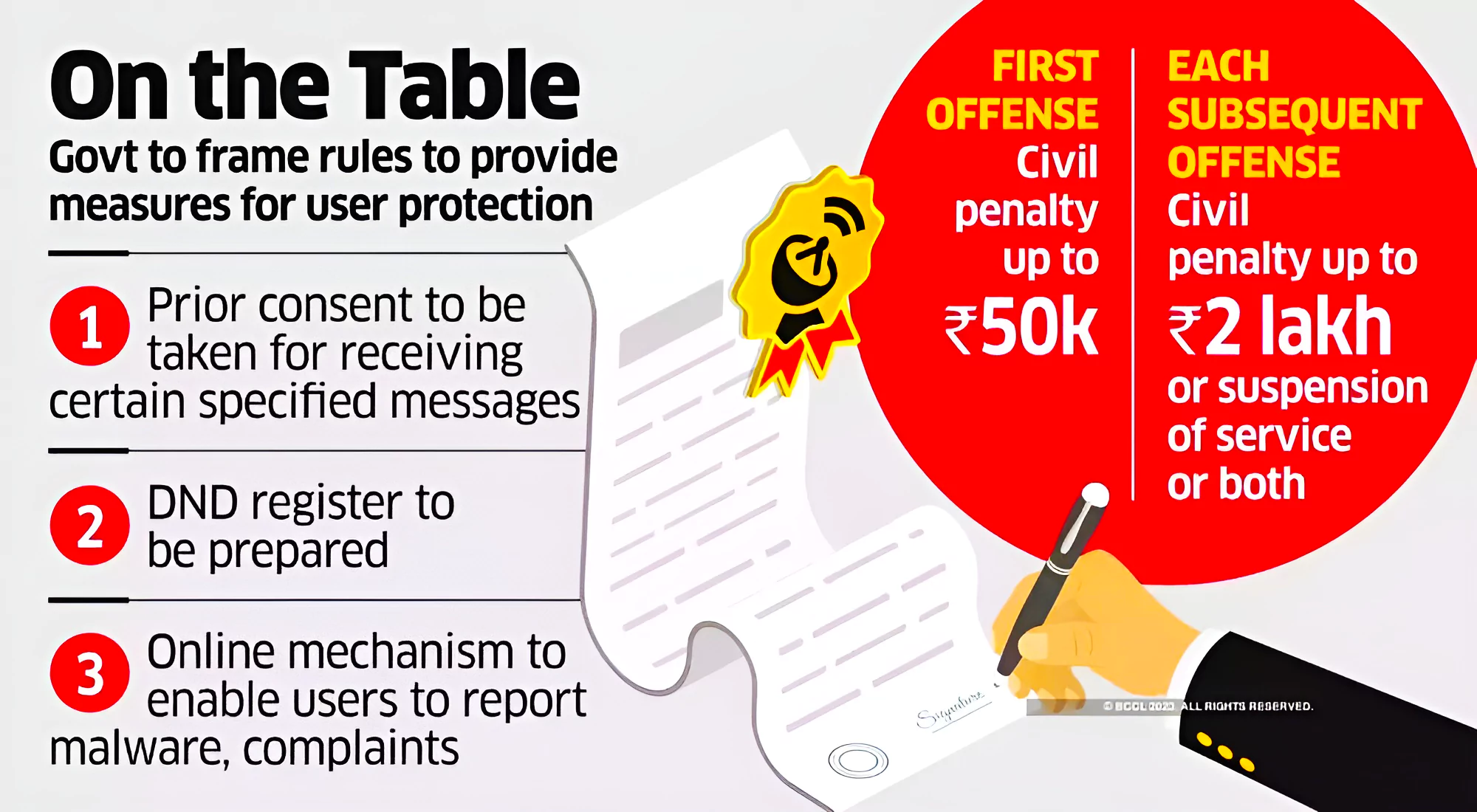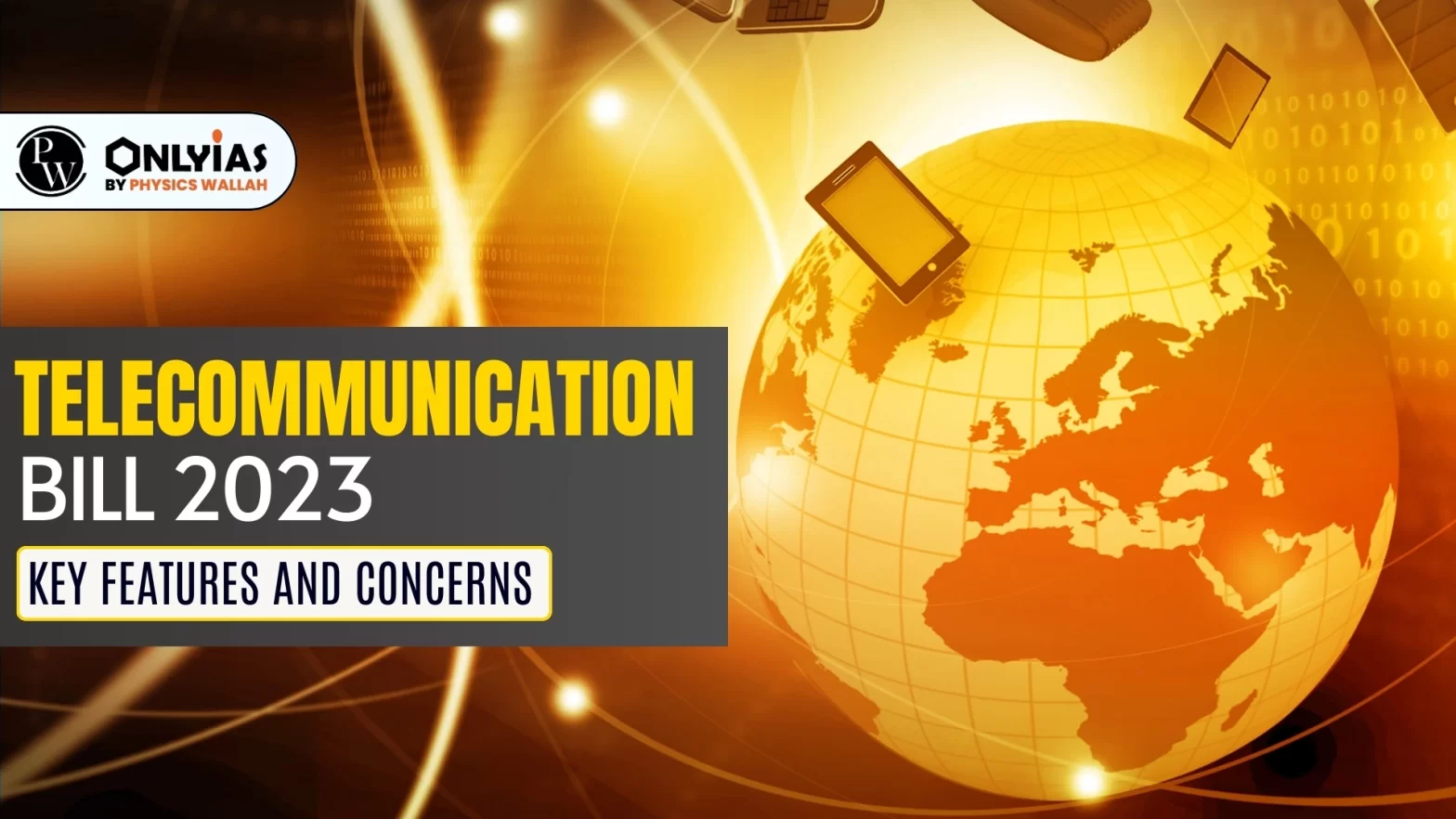Context: This article is based on the news “Telecommunication Bill 2023: The changes it seeks in the telecom sector, why some have raised concerns” which was published in the Indian Express.
- The Telecommunication Bill 2023 was introduced in the Lok Sabha by the Union Minister for Communications, Electronics & Information Technology.
| Relevancy for Prelims: Telecom Regulatory Authority of India (TRAI), Indian Telegraph Act, 1885, and Indian Wireless Telegraphy Act, 193.
Relevancy for Mains: Telecommunication Bill 2023: Why is it needed? It’s key features and related concerns. |
About Telecommunication Bill 2023

- Streamlining Telecom Activities: The Telecommunication Bill 2023 aims to streamline the existing licensing system for telecom networks by transitioning to an authorization system.
- Currently, the telecom department issues over 100 types of licenses, registrations, and permissions, and the bill aims to consolidate many of them into a single authorization process.
Telecom Regulatory Authority of India (TRAI)
- About: It is a statutory body established under the Telecom Regulatory Authority of India Act, 1997.
- Mandate: To regulate telecom services, including fixation/revision of tariffs for telecom services previously vested in the Central Government.
- TDSAT: The TRAI Act 1997 was amended to establish a Telecommunications Dispute Settlement and Appellate Tribunal (TDSAT) to take over the adjudicatory and dispute functions from TRAI.
Indian Telegraph Act, 1885
- It governs the use of telegraphs in India.
- It empowers the government to take possession of telegraphs, regulate the use of telegraphs, and intercept messages in certain circumstances.
Indian Wireless Telegraphy Act, 1933
- It regulates the possession of wireless telegraphy apparatus.
Telegraph Wires (Unlawful Possession) Act, 1950
- It regulates the possession of telegraph wires and provides for the punishment of the offense of unlawful possessions.
|
- Overhauling Telecom Legislation: It repeals the Indian Telegraph Act, of 1885, the Indian Wireless Telegraphy Act, of 1933, and the Telegraph Wires (Unlawful Possession) Act, of 1950.
- It also amends the Telecom Regulatory Authority of India (TRAI) Act, 1997.
Why is the Telecommunication Bill 2023 needed?
- Transformation of Sector: The telecommunication sector has witnessed significant transformations in the past decade, including changes in its nature, usage, and underlying technologies.
- For example, 5G technology and its application.
- Revamp of Archaic laws: India is a huge market for telecom and internet companies. However, the telecom sector in India was largely governed by three laws, two of which were made in colonial times and the third in the year 1950.
- The Telecommunication Bill 2023 creates a legal and regulatory framework that prioritizes the safety and security of telecommunication networks, while promoting inclusive digital growth.
Telecommunication Bill 2023: Key Features
- Authorisation for Telecom-related Activities: Prior authorization from the central government will be required to:
- Provide telecommunication services
- Establish, operate, maintain, or expand telecommunications networks
- Possess radio equipment.
Telecom Sector in India
- The Telecommunications industry is divided into the following subsectors: Infrastructure, Equipment, Mobile Virtual Network Operators (MNVO), White Space Spectrum, 5G, Telephone service providers, and Broadband.
- The Telecom industry in India is the second largest in the world with a subscriber base of 1.179 Bn as of August 2023 (wireless + wireline subscribers).
- India secures 2nd rank in “Mobile broadband internet traffic within the country” and “International Internet bandwidth”.
- The 5G network has been rolled out in all 28 states and 8 UTs.
|
- Assignment of Spectrum: Spectrum allocation will predominantly occur through auctions, except for specific use cases, where allocation will be done on an administrative basis.The government has listed 19 services/entities under the first schedule wherein spectrum can be given administratively bypassing the auction process.
- Such services include national security, defence, public broadcasting, disaster management etc, satellite services including global mobile personal communication by satellite services (GMPCS) license holders, BSNL, and MTNL.
- Apart from the first schedule, spectrum should be provided through auction.
- Interception of Messages: Messages between two or more persons may be intercepted on the specified grounds of:
- Security of the state
- Prevention of incitement of offences
- Public order
- Suspension of Telecom Services: The Telecommunication Bill 2023 allows the central government to temporarily take control of telecom services in case of an emergency in the interest of national security and in case of emergencies.
- Guidelines for Press Messages: The press messages accredited to the Central Government or a State Government shall not be intercepted or detained unless their transmission is prohibited under the applicable rules.
- Guidelines for Unutilised Spectrum: The Telecommunication Bill 2023 allows the government to take back a spectrum that is unutilized for insufficient reasons and also opens the door for sharing, trading, and leasing of the spectrum.
- It provides the option to surrender unused spectrum, but there will be no payment from the government for it.
- A voluntary undertaking mechanism has been introduced to encourage the voluntary disclosure of unintentional lapses and to facilitate compliance.
- Grievance Redressal: The dispute resolution process for breaches of terms and conditions includes a tiered structure, including an adjudicating officer, a designated committee of appeals, and the Telecom Disputes Settlement and Appellate Tribunal (TDSAT).
- Cyber Security Measures: The central government may provide rules for ensuring the cyber security of communication networks and services.
- Measures may include collection, analysis, and dissemination of traffic data that is generated, transmitted, received, or stored in telecommunication networks.
- Powers to Specify Standards: The central government can prescribe standards and assessments for telecom equipment, infrastructure, networks, and services.
- Telecom equipment needs to be procured from trusted sources only.
- Right of Way: In order to install telecom infrastructure, facility providers may request a right of passage over public or private property.
- Rights of way must be granted non-discriminatory and non-exclusive to the greatest extent feasible.
- Protection of Users: The central government may implement measures to safeguard users, including
- Obtaining prior consent to receive specific messages, such as advertising messages.
- Mechanism to allow users to report malware or specified messages.
- Appointments to TRAI: The Telecommunication Bill 2023 amends the TRAI Act to allow individuals with:
- at least 30 years of professional experience to serve as the chairperson
- at least 25 years of professional experience to serve as members.
- Priority Transmission of Messages during Disaster: During any public emergency, the Centre or a State government may temporarily seize any telecommunication service.
Universal Service Obligation Fund (USOF)
- USOF was set in December 2003 by amending the Indian Telegraph Act 1885.
- It provides widespread and non-discriminatory access to quality ICT services at affordable prices to people in rural, remote, and unserved areas.
- Telecom operators contribute 5% of their AGR (adjusted gross revenue) to the USOF.
|
-
- The government can establish a system to guarantee that messages sent by a user authorised for response and recovery are transmitted first.
- Digital Bharat Nidhi: The bill renames the USOF as Digital Bharat Nidhi and allows its use for research and development.
- Authority to Waive fees: The bill vests the power of the government to waive off entry fees, license fees, penalties, etc. in the interest of consumers.
Telecommunication Bill 2023: Concerns
- Privacy Concerns: To curb fraud, entities are mandated to carry out biometric authentication of their users. This raises concerns related to the privacy of users.
- Ambiguity in Definition: The new definition of ‘telecommunication services’ has been kept generic and is prone to wide interpretations.
- The specific reference to OTT communication services has been removed from the definition of ‘telecommunication services.
- Possession of Network: The Telecommunication Bill 2023 gives the government the authority to “take temporary possession” of the network.
- According to experts, the government needs to define “possession” and specify how long a “temporary” term would last.
- Potential Misuse of Power: The Telecommunication Bill 2023 empowers the central and state governments to suspend communication during any public emergency’ or ‘in the interest of public safety’. This power could be misused to curb dissenting voices.
- Restrictive Powers of TRAI: The draft also seeks to allow the appointment of private sector corporate executives for the role of TRAI chairperson.
- This shift might limit TRAI’s role with no industry watchdog having a neutral and independent approach crucial for fostering progressive and positive growth in the telecom sector.
- Spectrum allocation: Private telecom companies are divided on this matter.
- During TRAI’s consultation process in June this year Elon Musk’s Starlink, Amazon’s Project Kuiper, and India’s Tata Group opposed allocation of satellite spectrum through auction. Meanwhile, Bharti Airtel and Reliance Jio supported spectrum auctions.
Must Read: Regulation Code For OTT Platforms In India
Conclusion:
- The Telecommunication Bill 2023 represents a progressive step towards the telecommunication reform process.
- However, concerns raised by the stakeholders should be addressed.
![]() 19 Dec 2023
19 Dec 2023


